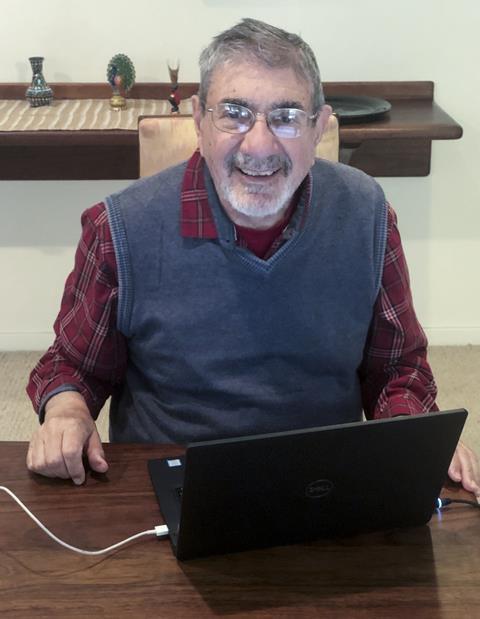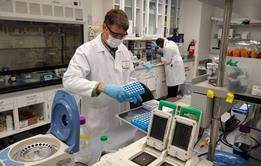Manuscripts and Zoom calls have kept Zare busy while in self-isolation at Stanford University.

During this difficult time, Chemistry World will be checking in with notable chemists around the globe to see how they are weathering the coronavirus pandemic.
‘It is very real, and my wife and I are staying at home and trying not to go out – only for necessities,’ explains Dick Zare, Marguerite Blake Wilbur Professor in Natural Science at Stanford University. He and his wife have confined themselves to home since mid-March because they are over the age of 65 and thereby considered high-risk for contracting Covid-19. Making matters worse, they live on Stanford’s campus, which is located in an area of California that is a hotspot for the virus.
In quarantine
Their self-imposed quarantine came just days before Stanford closed down on 16 March for at least three weeks, after news broke that an undergraduate is confirmed infected with Covid-19. Orders to shelter-in-place were issued for all residents of the county where Stanford is located, as well as several neighbouring counties, lasting from 17 March through 7 April, and recently extended to 3 May. ‘The campus is very deserted and quiet – it is eerie,’ says Zare, who pioneered the use of lasers to study chemical reactions and has more recently used mass spectrometry to find that microdroplets of water spontaneously produce hydrogen peroxide.
He is definitely not bored, though, with plenty to keep occupied. ‘I am still catching up with things that have to be done,’ he says. For example, he is busy trying to revise some manuscripts. ‘This is forcing me to learn about nanobubbles, a topic that I know so little about, but which I need to know more,’ he notes.
Zare is mostly communicating with his students virtually, through programmes like Skype and Zoom, and is facing over 100 emails that need responses. During this period of isolation, he enjoys talking to students and family, and he is preparing to deliver a three-hour teleconference course on ion mass spectrometry to students in Cuernavaca, Mexico, in ‘the service of human health’.
In the meantime, research labs on campus stand empty. Although the shelter-in-place order allows for exceptions for ‘essential business’, including equipment maintenance or keeping cell cultures or research animals alive, but it generally does not apply to the people conducting the research, explains Zare. ‘There are no further experiments to be done – you can read the literature, and can write research proposals and papers, and you can communicate remotely with people, that is all possible at home.’
Shutting down
Zare says it was a ‘painful and sad process’ to close his lab because he believes that the shutdown will last more than three weeks. ‘Thanks to the cooperation of my students and the help of the chemistry department staff, the shutdown was accomplished in an orderly manner, but it will involve some start time to restore the operations of the equipment,’ he states. ‘I am appreciative that everyone in my research group understood that it was necessary to make this sacrifice for the good of the community.’
Most of the members of Zare’s research group have gone to their homes. One has travelled to Oregon to avoid people and be with family, and another is self-isolating after requesting a coronavirus test but being told that those few that are available are reserved for older people who are more vulnerable.
The university will continue to provide living and dining options only to those undergraduate students who have no other option but to remain on campus. All other students had to leave by 18 March.
Under Stanford policy, final papers and projects were due no earlier than 23 March, and exams are delayed. The deadline for professors to submit final grades for graduating students has been extended to 29 March, and the date for professors to submit all other final grades was pushed back by about two weeks to 5 April.
Meanwhile, stuck at home, Zare and his wife are having some difficulties getting groceries delivered to their home – most notably eggs. But, by and large, they are managing with quick trips to local stores, and are sharing household responsibilities. ‘I like to cook,’ Zare says. ‘This morning I made buckwheat pancakes. Tonight I am planning to make butter chicken for dinner, an Indian dish that we both enjoy.’
After working all day, the two are finding themselves watching many more TV movies than they ever have before. They are also setting up weekly extended family conferences by Zoom.
Chemists amid coronavirus

How chemists around the world are coping with life and work during the Covid-19 pandemic
- 1
- 2
 Currently
reading
Currently
reading
Chemists amid coronavirus: Dick Zare
- 4
- 5
- 6
- 7
- 8
- 9
- 10
- 11
- 12
- 13
- 14
- 15
- 16
- 17
- 18
- 19
- 20
- 21
- 22
- 23
- 24
- 25
- 26
- 27
- 28
- 29
- 30
- 31
- 32
- 33
- 34
- 35
- 36
- 37
- 38
- 39
- 40



























































































1 Reader's comment